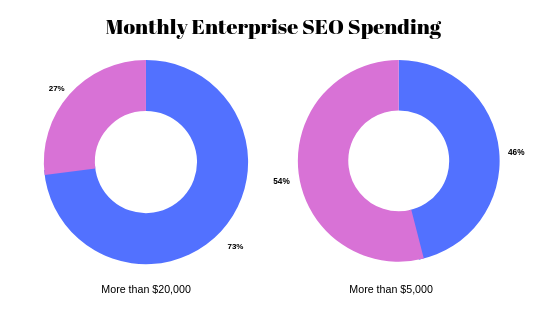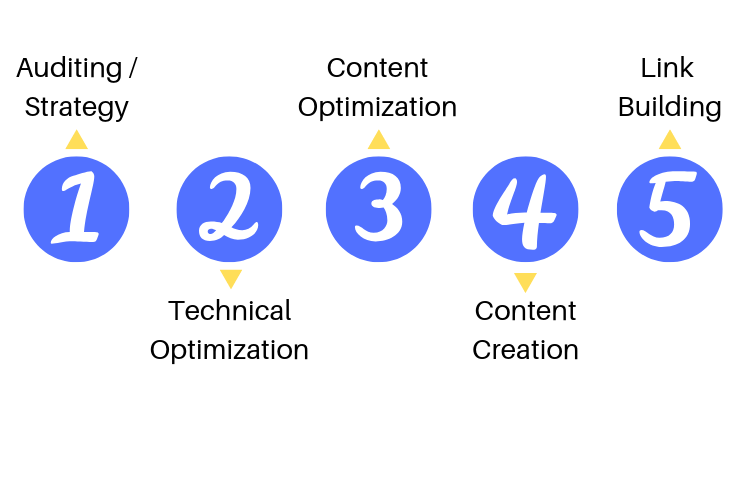For years companies spent large percentages of their annual revenue on traditional marketing techniques, like billboards and newspaper advertisements, and while they obviously saw increases to their bottom lines, the results were difficult to track.
Herein lies one of the major benefits of digital marketing as a whole, the ability to track where your users are coming from and exactly how much they are worth to your company.
But digital marketing involves a multitude of traffic channels, and not every channel will provide the same level of results. Dividing up your marketing budget properly is essential. Organic Search is one channel that can drive significant amounts of traffic, but dominating search results requires strategy, consistent optimization, and analysis and that requires an SEO budget.
Allocating your Marketing Budget across Channels
In 2017, according to Twin Word, more than 26% of enterprises spent more than $20,000 per month on SEO services, and more than 54% spent $5,000 or more each month.

But in terms of marketing, there are a number of channels that businesses utilize in their marketing budget, so where does SEO fit in?
SEO is unlike any other digital marketing traffic channel (or traditional marketing channel, in fact) in that companies fight to rank in search results for keywords the user is searching for. In traffic channels like Paid Search or Display Ads, you are paying to have your company displayed to users rather than compete directly with other companies’ search results. There are no advertising dollars allocated to Organic Search, only the agency work of content creation and technical optimization.
While SEO is competitive in nature and can take some time to see results from completed work, 32% of companies that dedicated a portion said it provided them with the highest ROI of all digital marketing channels.
In 2017, all digital marketing channels were allocated, on average, 30% of the overall marketing budget, and this is expected to continue to increase. Of all the digital marketing channels, SEO should be your primary focus for a number of reasons.
- Especially when compared to PPC campaigns, investing in Organic Search can be a more cost-effective traffic channel.
- More and more users are shifting to Mobile Search, and the more search result real estate your business occupies, the more visible your brand will be.
- There are between 40-60 billion searches each month on Google alone.
With a number of different factors in an SEO campaign, including content creation and optimization as well as technical SEO, many businesses allocate a significant portion of their budget toward SEO efforts, and this number obviously increases with overall revenue totals.
Detailing out your SEO Budget
To get even more granular with your marketing budget, you need to divide up your SEO budget by:

These budgets vary depending on your site’s needs at a given time, as well as where you’re at in the SEO strategy process.
For example, if you are just implementing an SEO strategy you will want to front-load the initial budget plan with time and resources for audits to help drive the rest of your SEO efforts. If you have gone through the initial technical phase and have identified areas of opportunity, content creation and optimization are where you will want to focus the bulk of your SEO budget at that time.
It truly depends on where your company is in your marketing efforts, but here are the areas of concentration we focus on in any SEO engagement:
- Auditing/Strategy: One of the most important aspects of strategic SEO is to complete technical and content audits to help devise an actionable plan to improve your website’s visibility.
- Rules of Engagement: Audits can take up to 3 weeks to complete but are invaluable assets to your overall SEO strategy.
- Technical SEO: Even with well-written content, your site may not be achieving everything it needs to because of technical issues. These are discovered during the audit phase and can help uncover opportunities to increase site speed, correct duplicate content, fix redirects, and many other aspects of the technical side of your site.
- Rules of Engagement: The time and budget required for technical recommendations and correction largely depend on how complex the issues are but a solid engagement will include an audit, recommendations, and implementation support.
- Content Optimization: In addition to creating new content, you also need to focus on improving existing content as well. This begins with in-depth Keyword Research and on-page content optimization including metadata, header tags, and body content.
- Rules of Engagement: Content Optimization is more than simply updating metadata and adding keywords, it’s strategic keyword targeting and depending on the size of the site, full optimization can take anywhere from 3 – 12 months.
- Content Creation: When creating content, you need to ensure that the information you provide users is matching their search intent and providing real value to them. At iPullRank, we ensure every piece of content we create is 10x, or in other words, 10 times better than anything else found online in the same space.
- Rules of Engagement: The turn-around time and cost of content creation vary depending on the type of content. For budget, keep in mind that content creation is heavily based on the labor of a highly staffed team of writers, designers, and developers.
- Link Building: Building high-quality links to your site can take time, effort, and money for potential PR campaigns, however, this will have a positive impact on your site’s rankings and organic traffic.
- Rules of Engagement: DO NOT BUY LINKS. EVER. Build links organically through outreach to repair broken links. Buying links rather than building them naturally is a black hat SEO tactic that will hurt your website’s visibility and ultimately get it penalized. Read more on building links in the age of spam.
Engaging Your SEO Budget
Regardless of what your company’s revenue is, you should allocate as much of your budget as possible to SEO efforts to ensure you’re getting the results you need. When engaging with an agency partner be sure to discuss your short-term and long-term goals. This determination will allow a skilled SEO agency to determine how best to structure your engagement.
- If you are looking to correct course on a sagging portion of your business, an all-up Technical Audit may waste valuable time. Targeted keyword research, content optimization and link building may prove more valuable.
- If you are looking to launch a new site, then the full suite of services will prepare your initiative for launch and will be the best use of your marketing dollars.
- If you’ve been given a minimal SEO budget, use it to test SEO and work very closely with your agency partner to ensure results so you can secure more budget next round.
What percentage of your company’s revenue did you allocate to the SEO marketing budget in 2018? How has that shifted leading into 2019?






